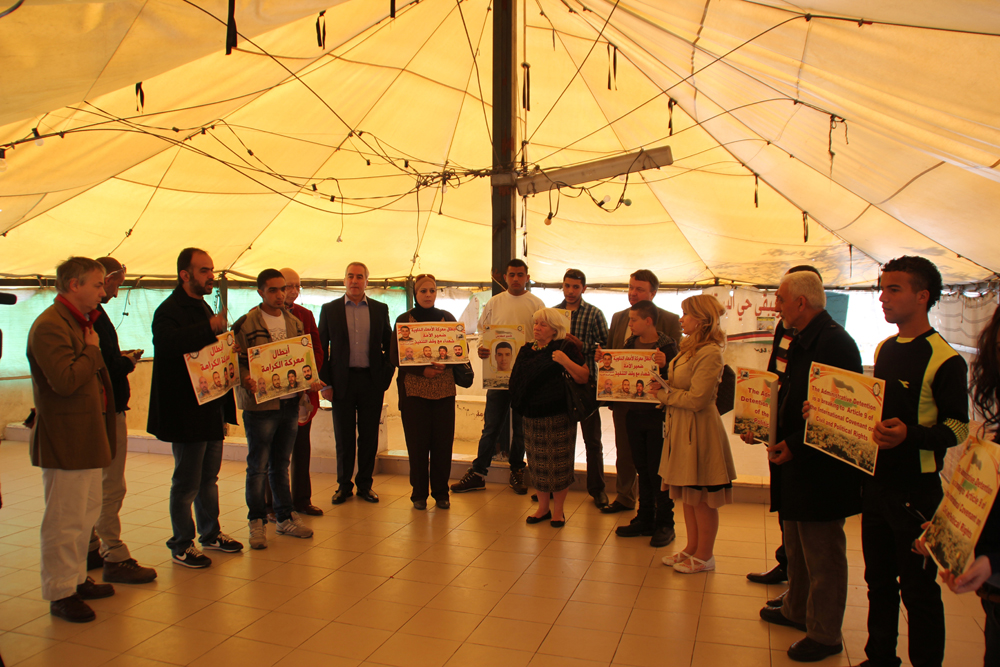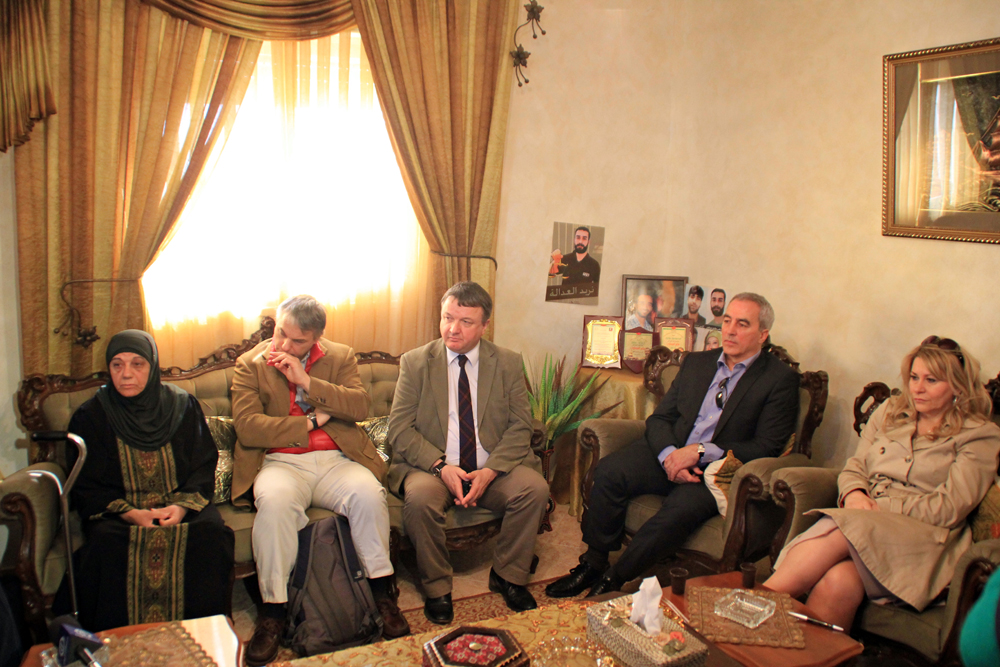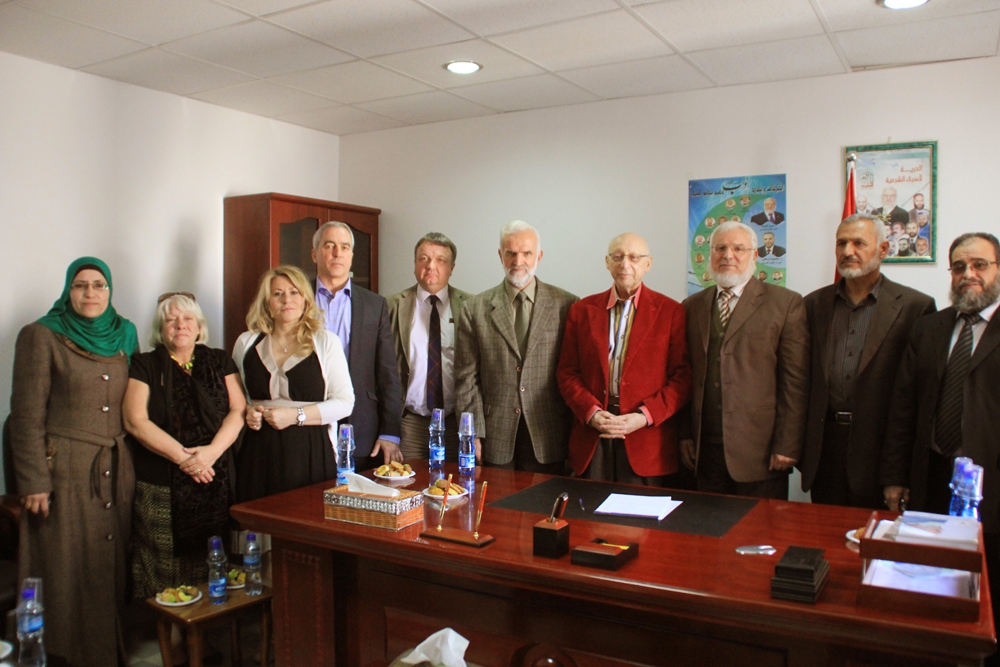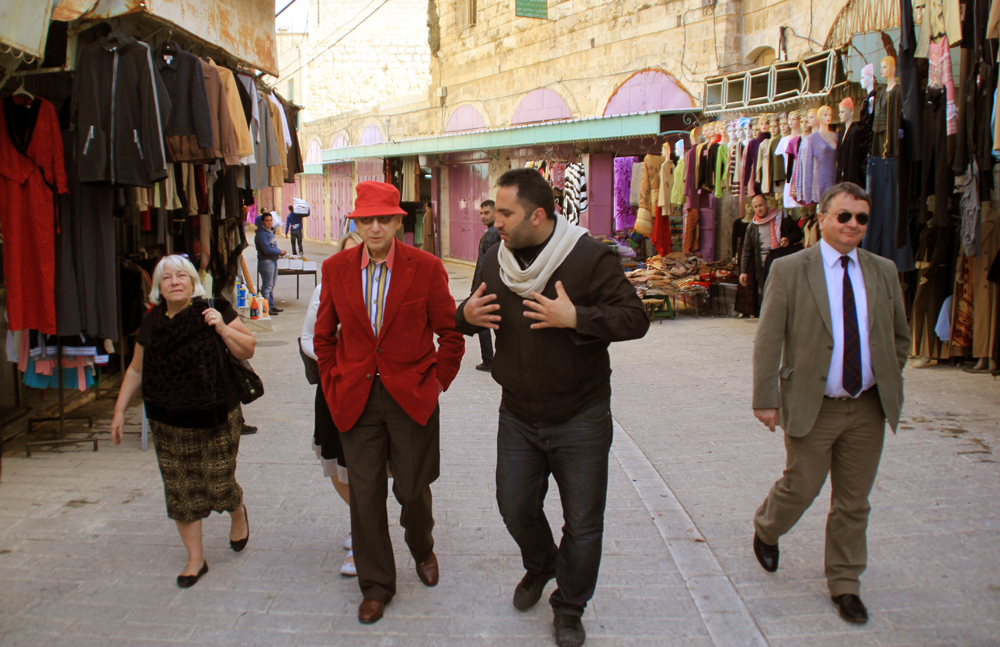The Council for European Palestinian Relations (CEPR) organized A European Political delegation to Jerusalem and Hebron between the first and the third of March, 2013. The delegation included Parliamentarians from England, Scotland and Ireland. The delegation arrived, Friday, on the first of March to the occupied Palestinian territories of the West Bank in a mission to assess the situation of the Palestinian prisoners in the Israeli jails and their beleaguered families. The delegation visited Al-Eisawiya and Selwan areas in Jerusalem and the villages of Deir Samet and Sieer in Herbon.
On Saturday morning the second of March, the delegation set out to visit the sit-in tent in Al-Bostan neighborhood in Selwan area-Jerusalem. When they arrived, the delegation met with residents of the neighborhood and also Palestinian activists like Mona Barbar from the Ministry of Youth and Sport, Mr. Morad Abu Shafe' and Sheikh Mousa Auda from Al-Bostan Neighborhood's People Committee, Mr Jawad Siyam, the head of Wadi Al-Helwa Information Center and Mr Amjad Abu Asab from Jerusalem's Prisoners Committee.

While there, the delegation listened to a briefing on the history of the sit-in tent and the reason for setting it up and the Israeli threat to demolish Al-Bostan neighborhood and ethnically cleanse it of its Palestinian residents. The residents of the neighborhood were given the chance to talk about the continued Israeli detention of the neighborhood's men, women and children. They also talked about their feeling of insecurity because of the Israelis who disguise themselves as Arabs and sneak into the neighborhood. The delegation then headed to the house of Sheikh Mousa Auda to listen to testimonies of Imsalam Auda, 14 years old, and Yusef Al-Rashq, 12 years old, who had been arrested by the Israeli Occupation Forces (IOF) more than once and were put under home arrest. The delegation also met Amani Mousa, 26, who was shot in her lower jaw with a rubber bullet by the Israeli soldiers while in the balcony of her house in Silwan area-Jerusalem.
Afterwards, the delegation moved to Al-Isawiya area in Jerusalem to visit the family of Samer Al-Isawi who has been on a hunger strike in the Israeli jail for 230 days in protest against his detention. The delegation met with Samer's parents and his sister Shereen. Shereen talked about her imprisoned brother, the day on which he was arrested, and the day when he started his hunger strike. She also talked about the proceedings of the court , the two Israeli court hearings when Samer was convicted and called upon the delegation to help release her brother. Then Samer's mother talked about her sons and the number of years each of them spent in the Israeli jails. '' I don’t want nothing from this life but to see my son alive and out of prison'' she said. The delegates asked the family a few questions about Samer and his conditions in prison. Sir Gerald Kaufam promised to raise the cause of Samer in the next session of the British Parliament.

In the school yard opposite to Al-Isawi's house, the delegation held a press conference. International and local journalists and media workers attended the conference. Mr Patrick Sheehan, of the Irish Parliament, expressed his support and solidarity with the family of Samer Al-Isawi and mentioned that he was a prisoner in the British prisons in the late 1980s, and survived a hunger strike himself. Mr.Naser Qaws, the director the Palestinian Prisoners' Club in Jerusalem delivered a speech as well and demonstrated the suffering that the Palestinian prisoners go through in the Israeli jails and the violations of human rights committed by Israel against them.
Thereafter, the delegation headed to Hebron and met with the head of the Palestinian Legislative Council (PLC), Mr Aziz Dwaik and representatives of Hamas. Dwaik welcomed the European MPs and Mr Kaufman in particular; the latter had visited Dwaik during his own imprisonment. He expressed his appreciation for the MPs’ solidarity with Palestinians in Israeli prisons. Other representatives of the district of Hebron and members of the PLC had been invited to meet with the European delegation today, but had unfortunately been engaged elsewhere.

Once the MPs had introduced themselves, Kaufman spoke of his steady commitment to the Palestinian Cause and said that the MPs visit was designated for a follow up (on the issue of) the prisoners on hunger strike. He then went on to direct a word to the Palestinian people: “No to despair! Nothing lasts forever; Patrick Sheehan is a great example for this.” he said referring to the Irish “Troubles” with the British government. According to Gerald Kaufman, the only government that can have an actual influence on the Palestinian Cause is Washington. However, he continued, its leader shows no will to commit to it. Dwaik briefed the MPs on the situation of the hunger strikers; the circumstances they live in, their demands and numbers. To them and in fact to all Palestinians, he said, the international solidarity was crucial.
Lunch was followed by a visit to the old city of Hebron. The delegation learned about Israeli settlers’ assaults on local Palestinians and their effect on the economic and social life.
The group then travelled to Beit Awwa to visit the family of prisoner on hunger strike Ayman Sharawna. Local journalists (حوامدة) depicted the prisoner’s story and the MPs had the opportunity to speak to the family; especially to Sharawna’s mother who had joined her son in his hunger strike. In a symbolic gesture, the Sharawna family served the guests salt and water – the only nourishment the hunger strikers take in.

The MPs promised to take the story of Ayman Sharawna and his mother home and to address the issue of Palestinians prisoners in the European parliament.
Another prisoner’s home, the house of Arafat Jaradat in Saeer, was visited. Jaradat had died on 23th February after five days in Israeli custody. The delegation expressed their condolences to the family and learned about his medical record. Jaradat’s uncle and aunt were present and described the circumstances under which he was arrested. Finally, the delegation was given a copy of Arafat Jaradat’s autopsy report.


 Click on the image to view the trailer
Click on the image to view the trailer



